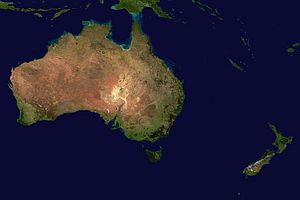Australia could soon be a leader in space-based data connectivity. That’s the hope behind the agreement just signed between Australia’s one-year-old space agency and Myriota, an Australian Internet of Things satellite company.
Australia’s space agency is aiming high, signing myriad agreements with foreign governments, multinational corporations, and local startups. But critics question whether the agency’s small budget — just $15 million this year — can support Canberra’s goal of building a $12 billion national space industry by 2030.
To increase its likelihood of success, Australia must target its resources. And to do this most effectively, it should coordinate with neighboring New Zealand. Both countries have recently created space agencies to build their space sectors. But New Zealand is further along in its efforts, and Australia should avoid replicating the niche New Zealand is building for itself in the space economy. For the benefit of both countries’ space sectors, Australia should complement, not compete with, New Zealand.
New Zealand is building its capacity as a launch services provider with clear commercial motivation. In 2015, the American firm Rocket Lab announced it wanted to build a launchpad in New Zealand. In 2016, Wellington created a space agency to oversee launches, paving the way for Rocket Lab to build its facility in New Zealand in 2017. The facility has since serviced seven launches. Rocket Lab’s customers include NASA and other American government agencies.
In Australia, the launch services situation is different. At least two Australian spaceports are reportedly in development — in South Australia and the Northern Territory — but no clear commercial reason exists for Australia to build up its launch capacity.
Australia’s main international partners in space are NASA and the European Space Agency (ESA) — it hosts ground stations for each — but neither of them seem likely to provide enough demand to support Australia-based launch services. This is because each already has new providers coming on board. NASA is already using New Zealand’s services, and ESA has Portugal, a member country that recently created a space agency and is building a launchpad in the Atlantic Ocean.
NASA is reportedly considering using one of Australia’s not-yet-built spaceports, but given Rocket Lab’s track record, NASA’s future demand seems more likely to go to New Zealand. Some launch service startups exist in Australia, but it seems improbable that they will catch up with Rocket Lab anytime soon. Australian officials tout the country’s Southern Hemisphere location as having benefits for launches, but New Zealand shares similar geographical advantages.
Given how new its space agency is, Australia is still in the process of developing its space strategy. Its policymakers ought to take advantage of this opportunity to formulate a strategy that complements New Zealand. If Australia cannot catch up with New Zealand as a launch services provider, it will end up wasting money and time. And even if it instead does manage to catch up to New Zealand, then the two countries will compete with each other and undermine their ability to make any profit.
To avoid this from happening, Australia should purposefully position its space economy to harmonize with that of New Zealand. It can do so in three ways. The first is for Australia to make sure it offers different sorts of launch services than those that New Zealand offers. Rocket Lab is providing services to launch modular satellites. Australian launch service providers could instead focus on something else, such as launches tailored to larger payloads like traditionally sized satellites or missions beyond Earth’s orbit.
A second way for Australia to coordinate with New Zealand is to target a different set of customers. Rocket Lab is close to the American government, which restricts its ability to provide services to firms or government agencies from other countries. NASA would likely, for instance, be uncomfortable with Rocket Lab launching Chinese payloads — Rocket Lab would thus likely avoid working with China to avoid alienating the United States.
Australia could exploit such openings in the market by working with customers from China or other countries. This would require Australia to work with a new set of actors in the space sector. But if Australia targets a different customer base than New Zealand, then the two will not be digging into each other’s market share.
A third option is for Australia to stay out of launch services all together and instead focus on other areas. It could do this where it already has competitive advantage: ground stations and astronomy, for instance. It hosts ground stations for ESA and NASA, including part of the latter’s Deep Space Network. It is also participating in the Square Kilometer Array, a multinational effort to build the world’s largest radio telescope — the array will include hundreds of telescopes, many of which will be located in the outback.
Alternatively, Australia could focus on entirely new areas such as space debris management. The agency has indicated interest in debris management, which is of growing importance as space becomes more crowded, so specializing in it now may set Australia up for long-term gains.
Australia’s space sector policymakers can pursue any of the above approaches. Or they can mix and match elements of each. The point is that Australian strategy should take New Zealand’s space industry into account. Right now, Australia risks vying with New Zealand as a launch services provider — a situation that may end up hurting both countries.
Both Australia and New Zealand have signed agreements with several other countries’ space agencies, but they have not yet signed an agreement with each other. As a first step, Canberra should sign an agreement with Wellington that defines complementary areas for the two countries to grow their space sectors. Only by coordinating with its neighbor here on Earth can Australia succeed as an important actor in the space economy.
Nicholas Borroz is a doctoral candidate at the University of Auckland’s business school. He specializes in comparative political economy.

































